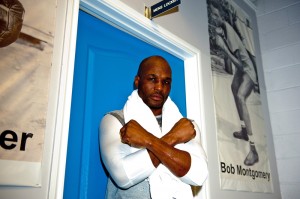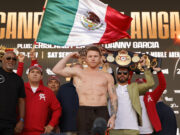
Bernard Hopkins will show up in wax next week. It ought to be granite. He’s been indestructible.
Hopkins’ defiance against time and his victories over opponents young enough to be his son continue like the clock that never seems to catch up with him. It will, of course. Nobody knows that better than Hopkins, who was wise enough to say this week in a conference call that he won’t still be fighting when he’s 50, yet he will be there for another opening bell on Oct. 15 against Chad Dawson just three months before he turns 47.
Like the graybeard he is becoming, he was philosophical, at times almost wistful, in a call that preceded his fight at Staples Center in Los Angeles where Ripley’s Believe It Or Not will unveil his wax figure. He couldn’t say when or where he’d answer his last bell.
“Can’t think about winning and retiring at the same time,’’ said Hopkins, who will defend the light-heavyweight title he won in a rematch against Jean Pascal.
But he was thinking about history, which he promised would include another chapter about a victory over the under-achieving, yet dangerous Dawson. In the end, history means a judgment, which is as inescapable as retirement. How will he be remembered?
Within the ropes, there won’t be much argument from anybody other than perhaps Joe Calzaghe. Calzaghe beat him on the scorecards in March, 2008, leaving Hopkins with one of his five losses. Calzaghe retired, unbeaten at 46-0. But 10 years from now, who will be remembered as the better fighter in history’s pound-for-pound debate, Calzaghe or Hopkins? I’ll argue that Hopkins will win that one every time. With no apologies to Floyd Mayweather Jr., Hopkins is the real face of boxing, which is more about conquering adversity than it is an unscarred record. Hopkins’ life is a boxing story, an American story which includes prison and a loss in his first fight.
In perhaps a sure sign that retirement is near, he now has arrived at a stage where he wants to be remembered for more than boxing.
“Boxing is what he did, but boxing is not who he is,’’ Hopkins said.
A healthy serving of self-promotion has always been part of the Hopkins personality. Some are offended by that. Many media colleagues are also offended by his racial comments. There was one last May directed at former Philadelphia Eagles quarterback Donovan McNabb. More notorious, perhaps, was the one he shouted at Calzaghe in the middle of a crowded media room in Las Vegas before Mayweather’s 10th-round TKO of Britain’s Ricky Hatton in December, 2007. He told Calzaghe that he would never let “a white boy” beat him.
I wasn’t there for the McNabb controversy when Hopkins, while training for the Pascal rematch, was reported to have suggested that McNabb, now with the Minnesota Vikings, wasn’t tough enough because he wasn’t black enough. But I was there for the Calzaghe exchange, which was pure theater in the hype leading up to their fight.
In one moment, Hopkins was joking with a circle of British writers, telling them that they had better health care in the UK than the U.S.
“Then again, you all drink a hell of a lot more than we do,’’ Hopkins said.
Then, he spotted Calzaghe. He raced across the MGM Grand’s ballroom, shifted his vocal chords from joking to angry and screamed “the white boy” comment at him. It was all in the setting and tone, yet media reports included none of that context. With only the quote, it appeared to be a racial insult.
In meeting with some media before Amir Khan’s victory over Zab Judah in July, Hopkins talked about how it might have affected the judging in his split-decision loss to Calzaghe
“I lost that fight when I called him light-skinned,’’ Hopkins told a circle of reporters, many of whom were light-skinned.
Be careful of what you read. Hopkins doesn’t take himself that seriously. When he is approaching 60 a decade from now, I’m not sure how he will look at himself. But boxing obviously will be the biggest piece in a fascinating puzzle. Still, priorities always change and it is beginning to look as if Hopkins is too.
Hopkins trained in Philadelphia with Dewey Bozella, who will fight on the Oct. 15 undercard. Bozella was convicted and imprisoned in 1983 for a murder he did not commit. He served 26 years before his conviction was overturned in 2009.
“His life is bigger than the sport …bigger than anything I’ve ever done,’’ said Hopkins, whose record of convictions as a 17-year-old led to a five-year sentence in Pennsylvania’s notorious Graterford Prison. “You don’t get a second life. I went into jail because I did something. I wasn’t innocent. He was innocent.
“That’s a difference, a big difference.’’
A wise one, too, from somebody who hasn’t defied time so much as he used it, evolved with it.
AZ NOTES
· As expected, Phoenix junior-welterweight prospect Jose Benavidez Jr. is scheduled for the Manny Pacquiao-Juan Manuel Marquez undercard on Nov. 12 at Las Vegas MGM Grand. Gary Bergeron (12-8, 7 KOs) of Chalmette, La., is the scheduled opponent. But expect changes. Benavidez (13-0, 12 KOs) does. There were three to four changes before his last victory, a first-round stoppage, on Sept. 17 in Parker, Ariz. Bergeron, loser of his last three fights and 2-6 over his last eight, is also scheduled for a bout on Nov. 11 in Australia, which means he would have to book a seat on the Space Shuttle to get to Vegas in time for opening bell.
· And while Kelly Pavlik considers a tune-up or two in an attempt to get his career back on track, Phoenix super-middleweight Jesus Gonzales continues to lobby for a shot at the former middleweight champ. Gonzales turned 27 on Monday. When asked what he wanted for his birthday, Gonzales said: “A fight with Kelly Pavlik. That’s better than a Grand Slam from Denny’s.’’
























